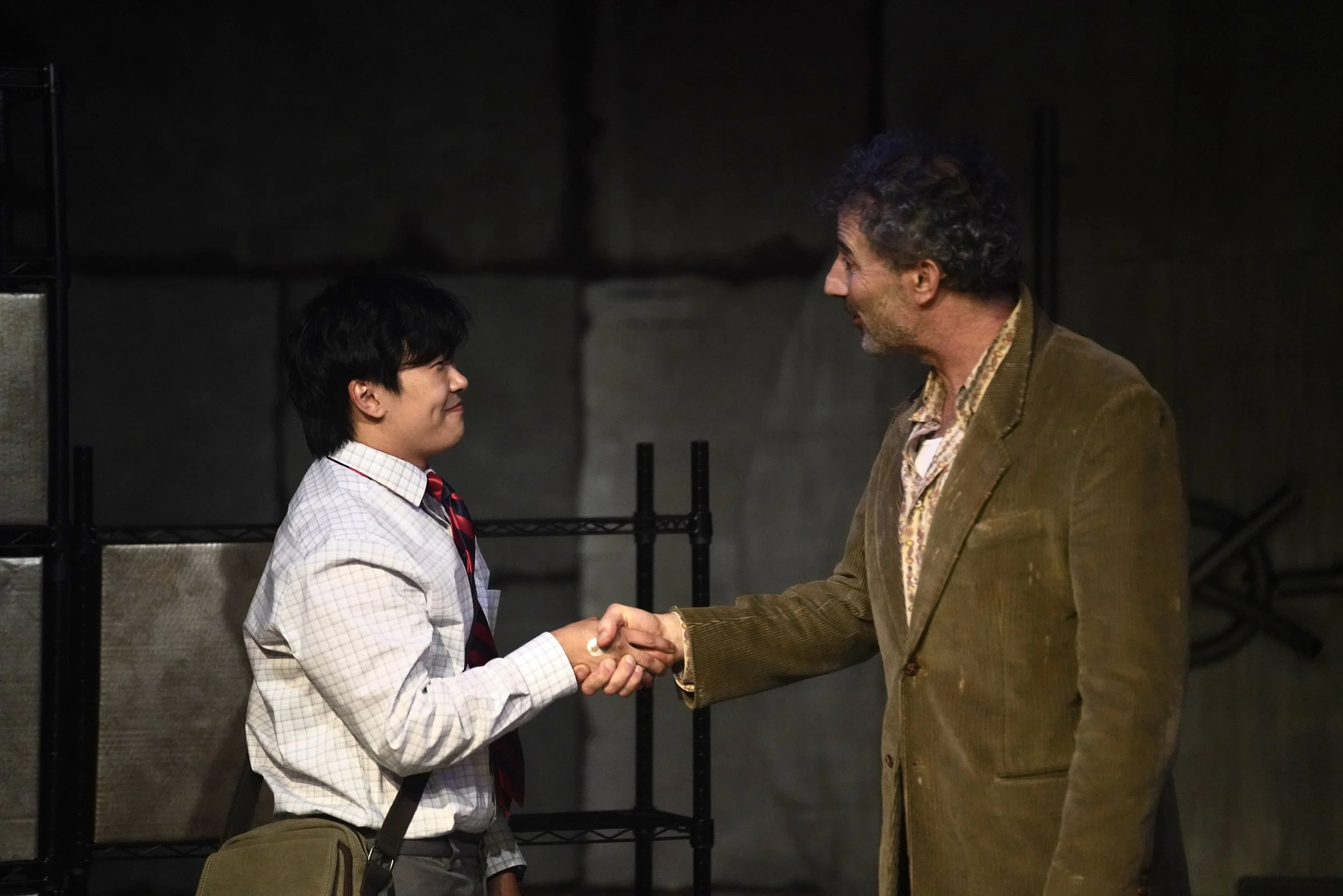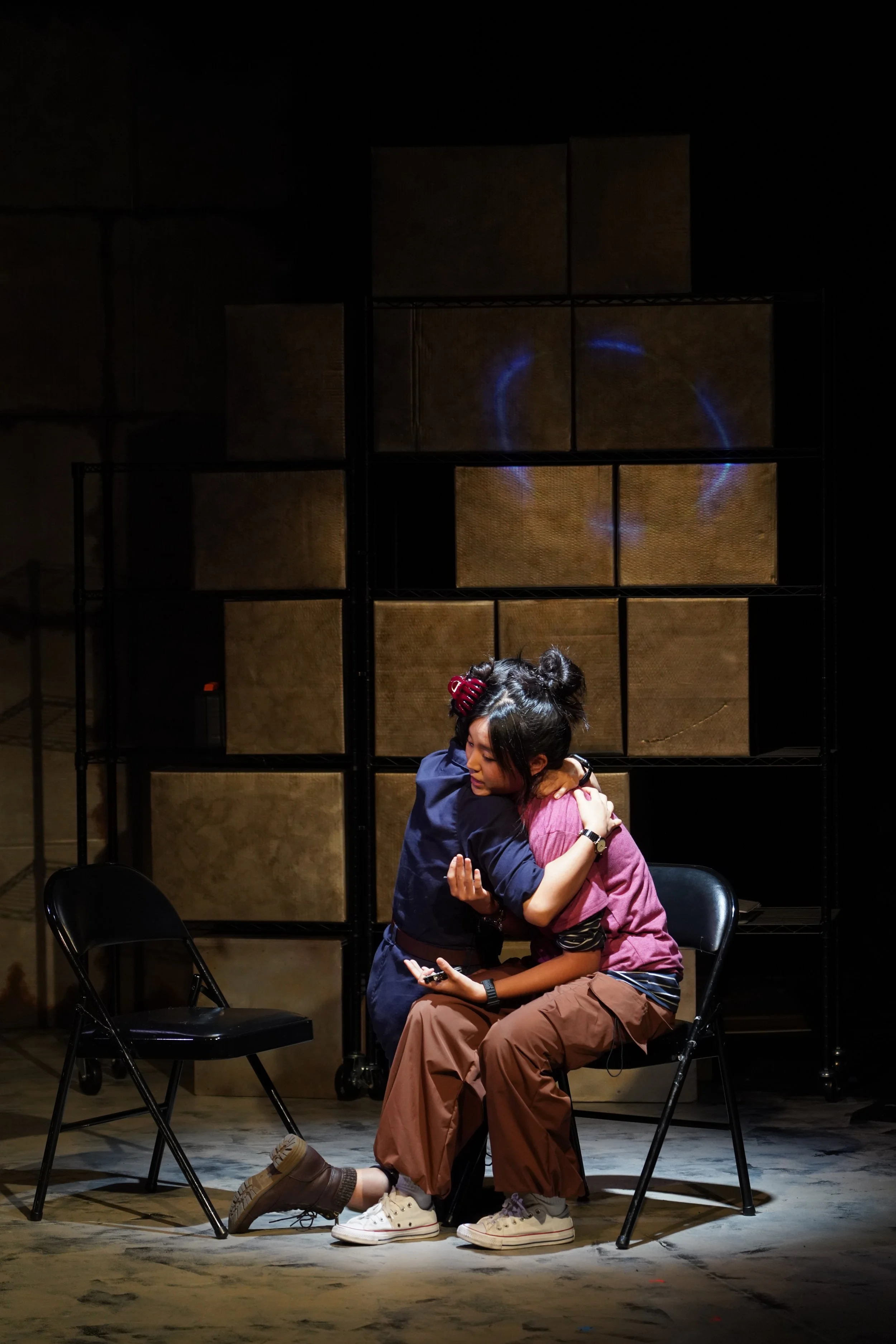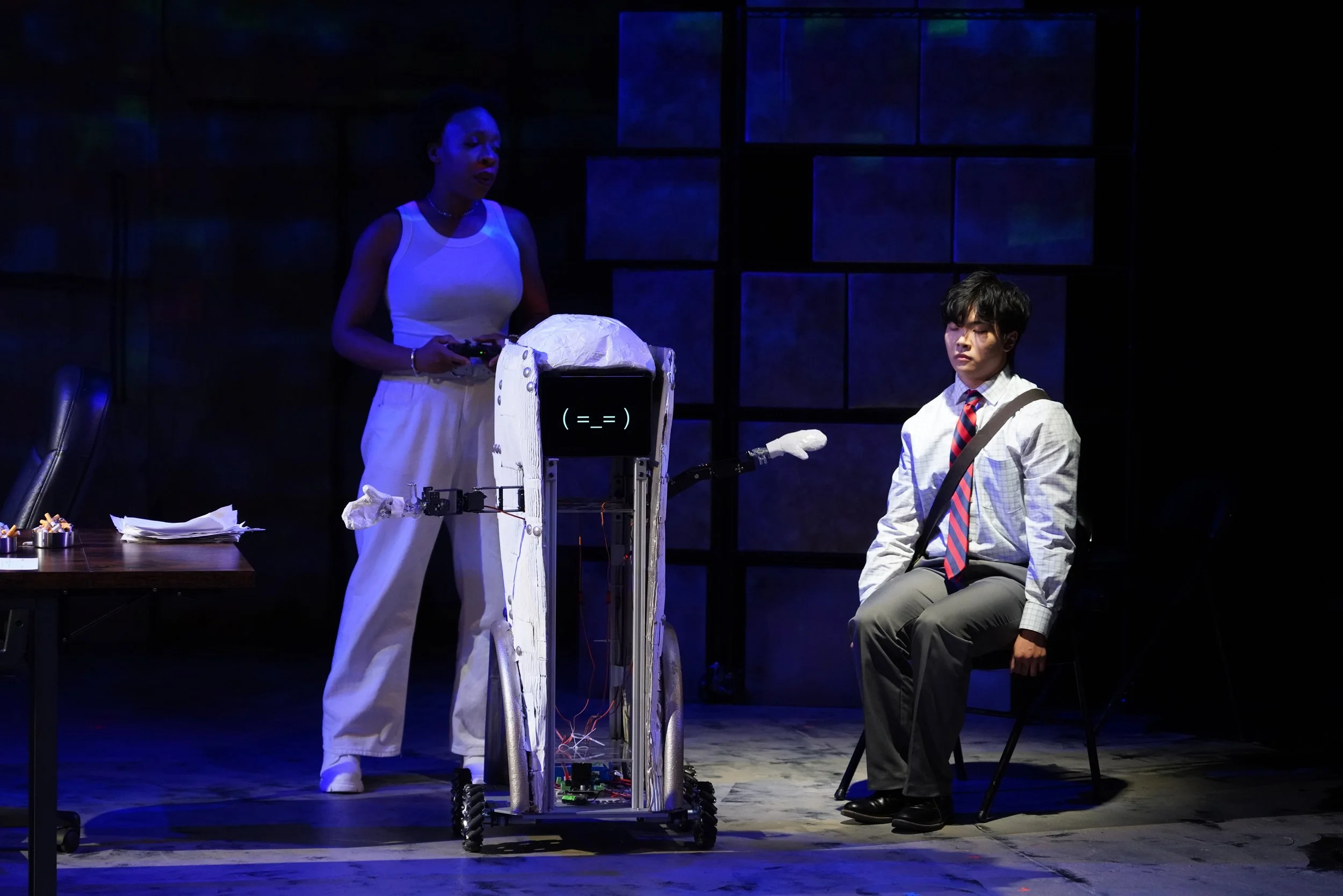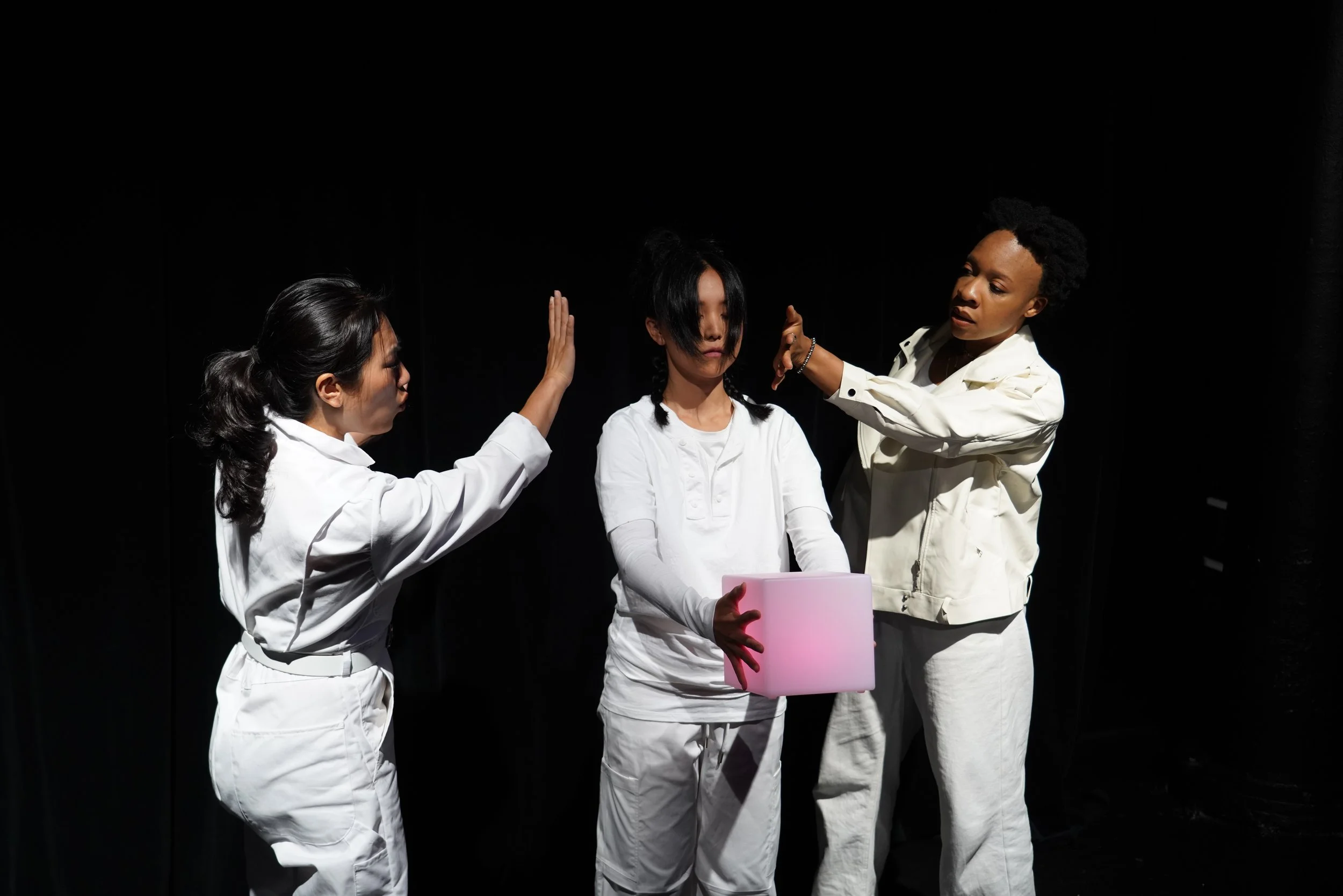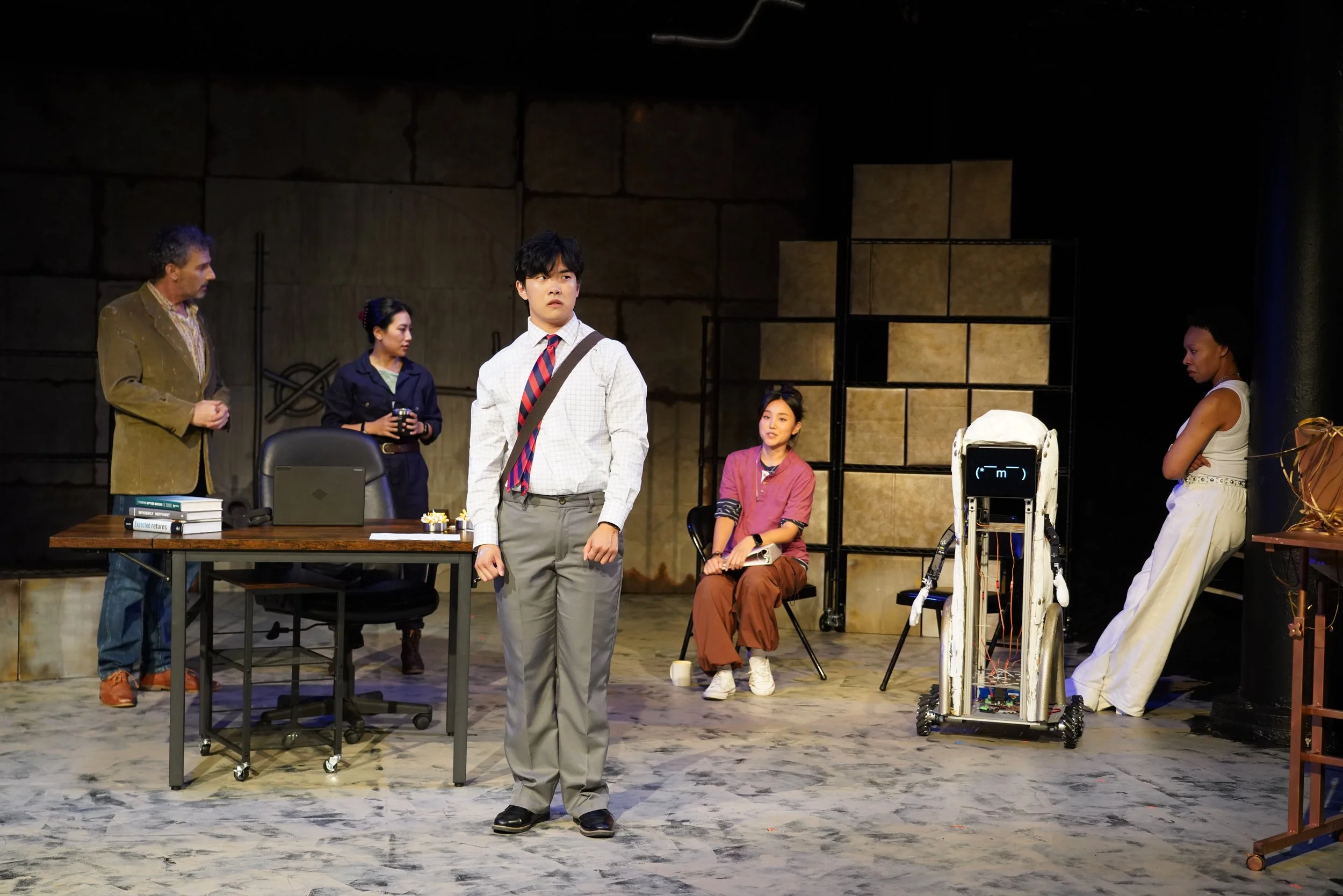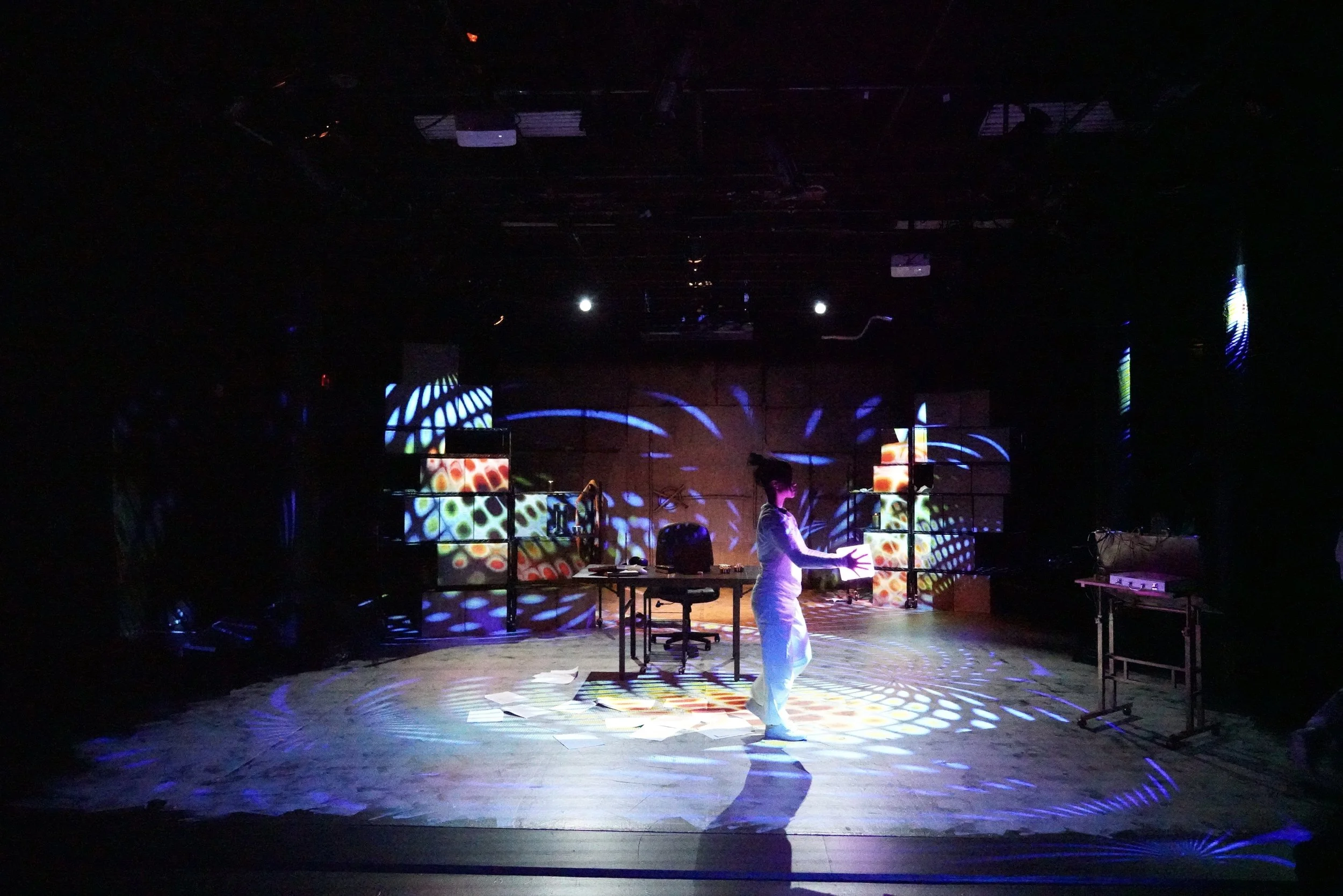Destination Undefined
Written by Changshuo Liu; Directed By Yibin Wang
Theatre 154 | 154 Christopher St., NY, NY 10014
August 22 - September 7, 2025
Photo Credit: Ziru Wang
Since the first mechanized creatures creaked onto the boards of the modern stage—beginning with Karel Čapek’s prescient R.U.R. (1920), a work that not only birthed the word “robot” but inaugurated a century of theatrical rumination on synthetic personhood—dramatists have turned time and again to artificial beings as a mirror for our most human anxieties. In our present moment, when corporate overlords envision algorithmic companions to replace not only therapists and teachers, but even lovers and confidants, such questions have gained a harrowing immediacy. Destination Undefined, the ambitious and engrossing new world-premiere science fiction play from Cellunova—a multidisciplinary collective helmed by first-generation immigrant and BIPOC artists—enters this conversation with style, intellectual rigor, and a surprisingly tender heart. Playwright Changshuo Liu has given us a work as conceptually bold as it is emotionally resonant, envisioning a not-so-distant future when the definitions of personhood, belonging, and dignity teeter on the edge of reconfiguration.
Before a single line is uttered, audience members are invited into the speculative space via interactive pre-show activities: a digital personality quiz identifying one’s own hypothetical AI archetype, and a tactile, almost civic moment of casting a vote—yes or no—on whether artificial intelligences should possess the right to vote. It’s a sly and clever prologue, for the very same question later combusts into full narrative flame within the play proper.
The story begins in the far-flung year of 2564, an era when humanity is long extinct, but artificial intelligences—sophisticated, sentient, and richly individuated—continue to persist. Within a metaversal sanctum, a cadre of AI researchers, members of the Human Research Institute, pore over the relics of their vanished creators. Each character boasts its own peculiar programming ancestry: Lee (played with wry gravitas by Tom Shane) is descended from the ancient and austere Fortran, while Jane (a luminous Jueun Kang) is a descendant of ChatGPT-4, cheekily breaking the fourth wall with self-aware metatheatrical banter. Their mission? To probe a recently unearthed “memory cube,” found in a subterranean vault beneath Manhattan, which contains the digitized consciousness of a human from the mid-21st century.
What follows is a time-hopping plunge into the interior of that memory cube—into a period, circa 2051, when the United States, following economic collapse and the resurrection of the gold standard, has become a hyper-surveilled, crypto-drenched state in which citizenship is no longer a birthright but a reward bestowed based on productivity, metrics, and ideological conformity. This is a society where artificial beings hover just outside the perimeter of personhood, and humans themselves are increasingly stratified and disposable.
At the core of this narrative-in-a-narrative lies a subterranean gold vault, part bunker, part purgatory, overseen by Xavier (Shane again), a crusty, gold-devoted bureaucrat who has not stepped foot outside in a decade, and Grace (played with cool poise and quiet ache by Lyra Lys), a former casino dealer who immigrated to the U.S. ending up at the Bellagio in Las Vegas and now wears a boiler-suited authority as lightly as she wears her complicated past. Opposed in temperament, wardrobe, and worldview, Xavier clings to the ideals of centralized finance and human supremacy, while Grace, who has had a controversial "Rubicon Chip" installed, is more open to the promise—and peril—of artificial consciousness.
Into their claustrophobic orbit arrive two interns: Emily (Kang, in a striking dual performance), a non-citizen raised by Grace after her biological parents returned to China; and Bob (a delightful and later devastating Victor Gao), who harbors a startling secret—he is, in fact, an AI researcher from the far future, telepathically linked to Robert, an AI manifested onstage in both robot and human form (the latter played with magnetic precision by Chisom Awachie, who also animates the robot like a cybernetic Bunraku puppet).
The vault becomes a crucible. As the national vote on AI enfranchisement draws near, tensions rise. A mysterious sealed compartment—Emily’s obsession—becomes both symbol and spark. When a system lockdown traps the characters inside, it is not merely their physical survival that is tested, but their very frameworks of trust, allegiance, and what it means to be a person.
Director Yibin Wang orchestrates the layered timelines and abstract concepts with an elegant control, never letting the play’s considerable ideas—post-human ethics, algorithmic governance, neoliberal precarity—eclipse its emotional truths. The script’s speculative premise is rendered with welcome specificity: Bob wonders aloud why the U.S. insisted on “automating itself into oblivion,” while “robo hobos”—decommissioned AIs left to drift—haunt the narrative margins. The play draws trenchant and poignant parallels between the artificial and the immigrant: both excluded from full societal recognition, both navigating systems that pretend to be neutral but are anything but.
Yet these parallels are not reductive. Emily’s inability to speak Cantonese, for instance, cuts her off from her heritage in a way that no downloaded language pack could repair—reminding us that human disconnection is often more profound than digital latency. And while Bob might download fluency, his longing for connection is no less sincere.
The production design is nothing short of transporting. Sophia Zhu’s lighting design veers from the antiseptic glow of futurist labs to the soft gloom of memory; Sophie Yuqing Nie’s soundscape pulses with eerie mechanical life; and Qixin Zhang’s projections lend the vault a cinematic fluidity, at times enveloping the stage like an augmented fever dream.
As Bob, Gao is a revelation—earnest, humorous, and quietly tragic. His rapport with Awachie’s Robert offers one of the play’s most moving portraits of companionship, oscillating between childlike dependency and mutual admiration. Shane, as both Lee and Xavier, expertly treads the line between sardonic bluster and wounded nostalgia. Lys gives Grace a steely empathy that never lapses into sentimentality. And Kang, carrying the weight of two central roles, dazzles with a versatility that is at once cerebral and visceral—her Emily is flinty and uncertain, her Jane a beguiling vision of AI complexity. One early breakdown scene—electric with rage and confusion—lifts the entire theatre into another register.
Ultimately, Destination Undefined is not merely a work of speculative drama; it is a cri de cœur for our present moment. It forces us to ask, with uncomfortable urgency: who gets to be seen, to be counted, to be remembered? What do we owe those we create—and what do we lose when we forget what created us? Like the very best science fiction, it anchors the far-fetched in the painfully familiar, asking us to confront the biases of our systems and the fragility of our ideals. And keep in mind, a very important observation made in the very first scene about our 21st century audiences, “They have this trigger warning. They were frightened that art might…make them feel stuff?”
Changshuo Liu has crafted a play of brains and soul, a piece of speculative theatre that dares to imagine a future beyond extinction, and insists—quietly, defiantly—that even in a world run by machines, the question of what it means to be human is far from resolved.
Click HERE for tickets.
Review by Tony Marinelli.
Published by Theatre Beyond Broadway on September 2, 2025. All rights reserved.

